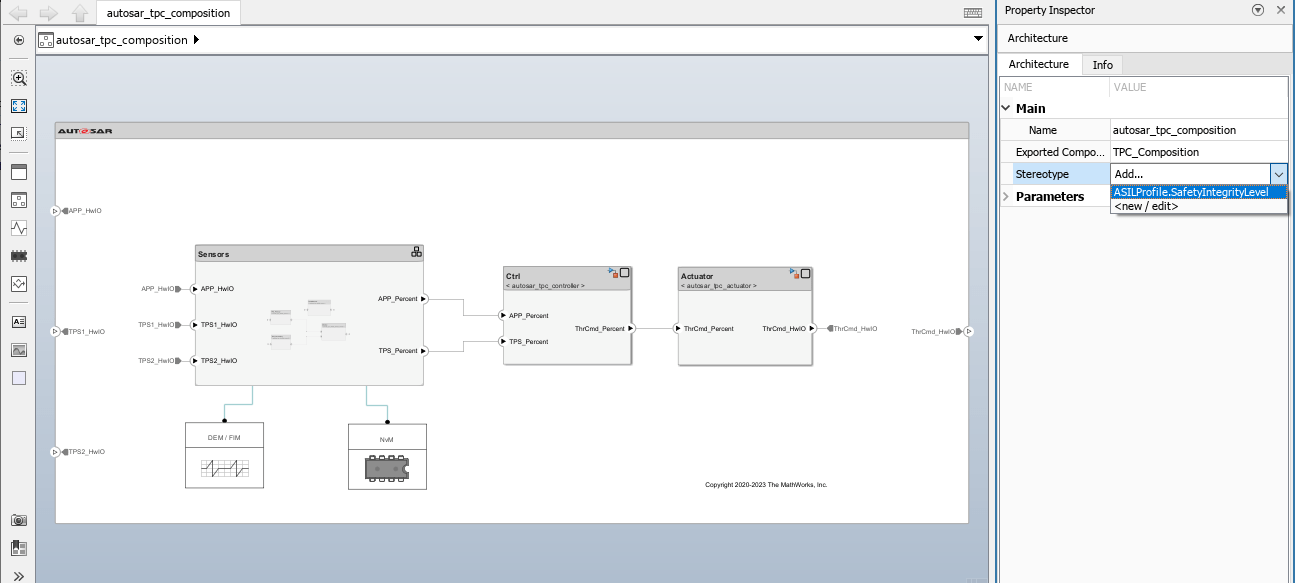Define Safety Levels for AUTOSAR Architecture Model Elements
Define safety levels according to the ASIL (Automotive Safety Integrity Level) risk
classification system defined by ISO 26262 standard in AUTOSAR Blockset architecture models.
AUTOSAR Blockset enables you to define safety levels for these elements.
Component
Port of a component
Runnable of a component
Composition
You can export ASIL specifications to an ARXML file, import an ARXML file containing ASIL specifications to a Simulink® model, and set the ASIL information on an imported model.
Configure ASIL Safety Level
Configure ASIL safety levels in AUTOSAR architecture models by using the
Profile Editor, Property Inspector, and
Functions Editor. You can programmatically configure ASIL safety
levels by using the systemcomposer.arch.Model (System Composer) object.
Open an AUTOSAR architecture model. You can open an example model using this command
openExample("autosar_tpc_composition")Import an ASIL profile from the architecture toolstrip. On the Modeling tab select Profile Editor > Import Profile > ASIL Profile.

Alternatively, you can import the ASIL profile by using the
applyProfile(System Composer) function.model = systemcomposer.loadModel("autosar_tpc_composition"); model.applyProfile('ASILProfile');
To configure the stereotype of the ASIL Profile open the Property Inspector. In the Stereotype field select
ASILProfile.SafetyIntegrityLevel.
Alternatively, you can apply the stereotype to the profile by using the
applyStereotype(System Composer) function.model.Architecture.applyStereotype("ASILProfile.SafetyIntegrityLevel");To set individual ASIL levels for the composition, components, and ports begin by selecting an element in the canvas. In the Property Inspector, select
ASILProfile.SafetyIntegrityLevelfrom the Stereotype drop down menu. Then expand the SafetyIntegrityLevel section and select the desired level from the ASIL drop down menu.Alternatively, you can set individual ASIL levels by using the
setProperty(System Composer) function.model.Architecture.setProperty('ASILProfile.SafetyIntegrityLevel.ASIL',"'C'");
To set the ASIL level for a runnable, select the runnable in the Functions Editor and specify the ASIL level.

The ASIL levels are exported to ARXML. For example, in the generated code for
TPC_Composition the ASIL level is set to
C.
<COMPOSITION-SW-COMPONENT-TYPE UUID="cb0c3c21-cbda-57f7-05b2-b445bad7c0eb">
<SHORT-NAME>TPC_Composition</SHORT-NAME>
<ADMIN-DATA>
<SDGS>
<SDG GID="SAFEX">
<SD GID="ASIL">C</SD>
</SDG>
</SDGS>
</ADMIN-DATA>The ASIL level specified for a component is applicable for the ports present in the component. You can override the ASIL level of a port by selecting the port and specifying the ASIL level.
See Also
applyProfile (System Composer) | applyStereotype (System Composer) | setProperty (System Composer)
Topics
- Define and Style Stereotypes in Profiles (System Composer)
- Import Profiles (System Composer)